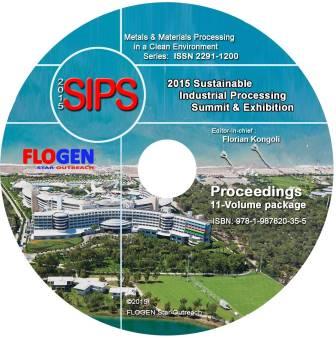2015-Sustainable Industrial Processing Summit
SIPS 2015 Volume 4: Meech Intl. Symp. / Mining Operations
| Editors: | Kongoli F, Veiga MM, Anderson C |
| Publisher: | Flogen Star OUTREACH |
| Publication Year: | 2015 |
| Pages: | 275 pages |
| ISBN: | 978-1-987820-27-0 |
| ISSN: | 2291-1227 (Metals and Materials Processing in a Clean Environment Series) |

< CD shopping page
Training Center for Artisanal Miners: Moving towards Effective Formalization and Mercury Reduction in Antioquia, Colombia
Hernan Ruiz1; Marcello Veiga2;1UBC, Vancouver, Canada; 2UBC-MINING, Vancouver, Canada;
Type of Paper: Regular
Id Paper: 477
Topic: 4
Abstract:
Artisanal gold mining (AGM) activities encompass small, medium, informal, legal and illegal miners in numbers close to 16 million and are responsible for producing around 380-450 tonnes/a or almost 12% of total mined gold. AGM is considered the main anthropogenic source of mercury pollution emitting and releasing around 1400 tonnes/a into the environment. In 2013, The AGM sector in Colombia produced 72% of the country's gold or around 40 tonnes/a of gold. In the Department of Antioquia, artisanal miners take their ores to Processing Centres to be amalgamated in small ball mills. On average, 50% of the mercury introduced in the process is lost: 46% lost to the tailings as mercury droplets and 4% lost as fumes when amalgam is burned. Miners usually do not need to pay for the amalgamation service as the Centres retain the Hg-contaminated tailings to leach with cyanide extracting the non-amalgamated gold which is usually around 75% of the gold in the ore. By 2010, 5 municipalities in Antioquia were emitting and releasing to the environment up to 110 tonnes/a of mercury. By 2013, thanks to an educational project implemented by UNIDO and local partners, 46-70 tonnes of mercury have been prevented from polluting the environment. The project adopted a strategy of educating the owners of the Processing Centres on cleaner methods to produce more gold consequently reducing the amount of mercury entering the amalgamation process. The success of this project motivated the Government of Colombia to invest in the idea of creating Training Centres for Artisanal Miners (TCAM), in which miners could be trained and educated. In 2014, the Government of the province of Antioquia in cooperation with the National Centre of Learning (SENA) created a US$6.5 million TCAM in the town of El Bagre, Antioquia to train conventional and artisanal gold miners in sustainable gold mining and processing techniques, legalization of informal miners, economic diversification, food security, ethics, accounting, business management, health and environmental issues in mining, social responsibility, etc. The SENA is also investing in training its trainers to run 3 other Centres in different locations in Antioquia. The Canadian International Resources and Development Institute (CIRDI) are working together with SENA to implement these Training Centers. The steps for the development of curriculum for the miners and implementation of the Centres are discussed in the presentation. Currently, there are 39 new mercury-free processing plants operating in Antioquia.